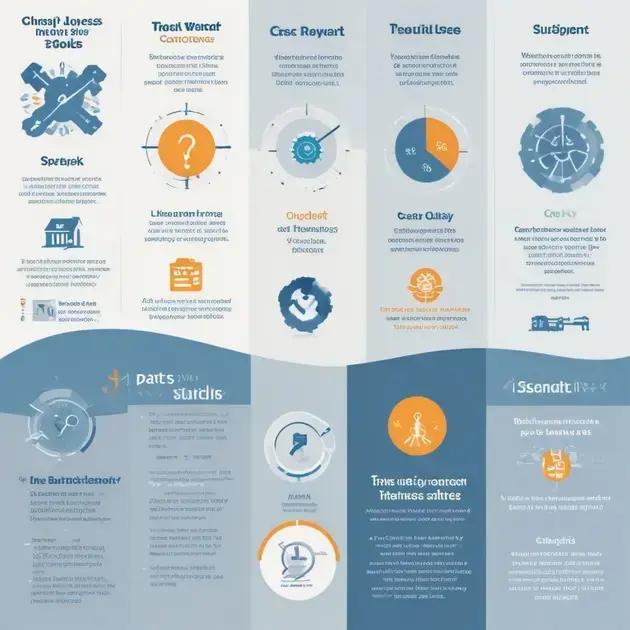Free business tools provide small businesses with essential resources for project management, communication, and marketing at no cost. By leveraging these tools, businesses can enhance productivity, streamline operations, and achieve greater success without incurring extra expenses.
Free business tools can be game-changers for entrepreneurs looking to optimize their operations. Whether you’re a startup or an established company, utilizing free business tools can enhance efficiency, reduce costs, and give you a competitive edge in your industry.
What Are Free Business Tools?
Free business tools are essential resources that can help entrepreneurs and small business owners streamline their operations without incurring additional costs. These tools cover various needs such as project management, communication, data organization, and marketing, making them accessible to businesses of all sizes.
Types of Free Business Tools
Some common types of free business tools include:
- Project Management Tools: Applications like Trello or Asana help teams organize tasks and collaborate efficiently.
- Communication Tools: Programs such as Slack and Zoom facilitate team communication, whether in-person or remote.
- Financial Tools: Services like Wave or Mint allow small business owners to manage budgets and track expenses easily.
- Marketing Tools: Platforms like Mailchimp offer free versions for email marketing campaigns.
By utilizing these tools, businesses can reduce overhead costs and improve overall productivity. They provide valuable functionalities that can support growth without requiring a financial commitment.
Top 5 Free Business Tools for Small Businesses

When it comes to managing a small business, utilizing the right tools can make all the difference. Here are the top 5 free business tools that are particularly beneficial for small businesses:
- Trello: This project management tool uses boards and lists to help teams organize tasks effectively. Users can create task cards, assign them to team members, and track progress in a visually appealing format.
- Slack: A popular communication platform that allows real-time messaging and file sharing among team members. It helps maintain open communication, whether your team is in the office or working remotely.
- Google Workspace (formerly G Suite): With free tools like Google Drive, Docs, Sheets, and Slides, businesses can collaborate on documents in real-time. This enhances teamwork and ensures that everyone has access to the same files.
- Canva: For businesses looking to create visual content without the need for a professional designer, Canva offers an easy-to-use platform. Users can design marketing materials, social media graphics, and more with a vast library of templates.
- Mailchimp: This email marketing service helps businesses build and manage mailing lists. The free tier allows users to send campaigns to a limited number of subscribers, making it ideal for small businesses looking to engage their audience.
Using these tools can help small business owners save money while improving efficiency and productivity.
How to Choose the Right Free Business Tool
Choosing the right free business tool is essential for enhancing productivity and efficiency in your business. Here are some key factors to consider:
1. Identify Your Needs
Before selecting a tool, take the time to identify the specific tasks you need assistance with. Are you looking for project management, communication, marketing, or financial tracking? Knowing what you need will help narrow your options.
2. Ease of Use
The user-friendliness of a tool is crucial, especially for small teams. Look for tools that have intuitive interfaces and straightforward features, so everyone on your team can use them without extensive training.
3. Integration Capabilities
It’s beneficial to choose tools that can easily integrate with other tools you are already using. This helps maintain seamless workflows and ensures that all your tools work together effectively.
4. Scalability
Consider whether a tool can grow with your business. Free tools often have premium features that can be unlocked as your needs expand. This flexibility can be advantageous as your business evolves.
5. Customer Support and Community
Check if the tool provides adequate customer support. A robust user community can also be helpful for sharing tips, troubleshooting, and improving your experience.
By carefully considering these factors, you can select the most appropriate free business tool that will help your small business thrive.
Benefits of Using Free Business Tools

Utilizing free business tools can provide numerous advantages for small businesses. Here are some of the most significant benefits:
1. Cost Efficiency
The most obvious benefit of using free business tools is the cost savings. These tools allow small businesses to access essential services without needing to spend on software or subscriptions, enabling them to allocate funds elsewhere.
2. Increased Productivity
Free business tools often streamline many processes, from project management to communication, which can result in enhanced productivity. With these tools, teams can collaborate more effectively and accomplish more in less time.
3. Access to High-Quality Features
Many free tools offer robust features that compete with paid options. Businesses can benefit from powerful functionalities, such as collaboration features, integrated solutions, and analytics, without having to invest upfront.
4. Flexibility and Scalability
Free tools often come with varying levels of service, allowing businesses to choose what works for them. As the business grows, they can easily transition to premium plans or more advanced tools without losing their initial investments.
5. Community and Support
Using popular free tools often means tapping into a larger user community. This community can provide valuable support, tips, and best practices, making it easier to solve issues and improve workflows.
By leveraging these benefits, small businesses can enhance their operations and maintain a competitive edge in their markets.
Real-Life Success Stories with Free Tools
Real-life success stories provide valuable insights into how small businesses have effectively utilized free tools to enhance their operations. Here are a few notable examples:
1. Trello for Project Management
One small marketing agency implemented Trello to manage their client projects. By organizing tasks into boards and assigning them to team members, they improved workflow visibility. The agency’s productivity increased, allowing them to take on more clients and meet deadlines more efficiently.
2. Slack for Team Communication
A small tech startup adopted Slack for internal communication. With channels dedicated to different projects, team members could share updates instantly. This reduced the need for lengthy email threads, resulting in faster decision-making and a more cohesive work environment.
3. Canva for Marketing Materials
A local café used Canva to design attractive promotional materials. Without spending on a graphic designer, they created eye-catching flyers and social media posts that drew in more customers. Their self-designed marketing efforts resulted in a noticeable increase in foot traffic and sales.
4. Google Workspace for Collaboration
A nonprofit organization utilized Google Workspace to collaborate on documents and track donations. By using Google Sheets and Docs, team members could work together in real time, improving transparency and accountability. This collaboration helped them organize successful fundraising campaigns.
5. Mailchimp for Email Campaigns
A small retail business leveraged Mailchimp to send out email newsletters. By using the platform’s analytics features, they tailored their campaigns based on customer preferences. This resulted in higher engagement rates and increased sales during promotions.
These examples illustrate how free business tools can provide significant advantages, allowing small businesses to operate efficiently and achieve their goals.
Embracing Free Business Tools for Success
Using free business tools can significantly boost your company’s productivity and efficiency. These tools provide valuable features without the financial burden, allowing small businesses to operate like the big players in their field.
From project management with Trello to email marketing with Mailchimp, the examples show that free tools can lead to real success. By choosing the right tools that fit your needs, you can streamline operations and enhance communication within your team.
As discussed, many businesses have thrived by implementing these tools, demonstrating their effectiveness. So, take advantage of what free business tools offer, and watch your business grow!
FAQ – Frequently Asked Questions about Free Business Tools
What are free business tools?
Free business tools are software or apps that help businesses with tasks like project management, communication, and marketing without any cost.
How can free business tools benefit my small business?
They can save you money, improve productivity, and provide features that enhance collaboration and efficiency.
Which free business tool is best for project management?
Tools like Trello and Asana are great for project management, allowing teams to organize tasks and track progress easily.
Can I use free tools for marketing?
Yes, platforms like Mailchimp and Canva offer free versions that can help you with email marketing and creating visual content.
Are there any limitations to using free business tools?
Some free tools may have limited features or user access compared to their paid versions, but they still provide valuable benefits.
How do I know which free tool is right for my business?
Assess your business needs, consider ease of use, integration options, and scalability when choosing the right tool.




